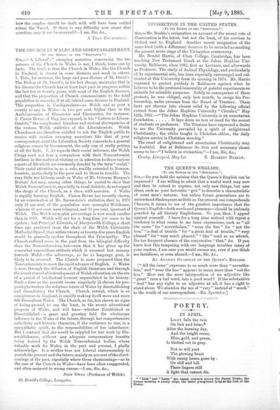THE QUEEN'S ENGLISH.
[To THE EDITOR OF THE " SPECTATOR.")
SIR,—Do you hold the opinion that the Queen's English can beimproved P I am willing to admit that a useful word may nowand then be coined to express, not only new things, but new ideas, such as your favourite " grit " to describe a characteristicof some men's natures; but unless future generations are tounderstand Shakespeare as little as the present one comprehends Chaucer, it seems to me of the greatest importance that theQaeen's English—both words and grammar—should be jealously guarded by all literary Englishmen. To you, then, I appeal against yourself. I have for a long time noticed with regret a tendency to what seems to me loose expressions, such as "all the same" for "nevertheless," "none the less" for "not theless," "a deal of trouble" for "a great deal of trouble," "very pleased" for "very much pleased," " like " used as an adverb, the too frequent absence of the conjunctive "that," &c. If you knew how this tampering with our language troubles many of your readers, I am sure you would excuse me, even if you think me fastidious, or even absurd.—I am, Sir, &c.,
AN A.NNIOUS GUARDIAN OF THE QUEEN'S ENGLISH.
[" All the s'ame" expresses to us much more than "nevertheless," and "none the less" appears to mean more than "not theless." How can the mere interposition of an adjective like
great" turn a bad word, into a good word ? If the substantive " deal " has any right to an adjective at all, it has a right tostand alone. We abandon the use of " very " instead of 'much to the wrath of our correspondent.--En. Spectator.]


































 Previous page
Previous page